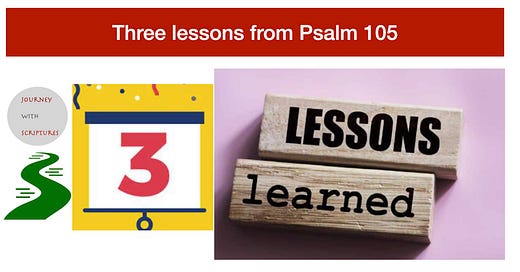Psalm 105:2-3, 36-37, 42-43
Psalm 105 is a meditation on the history of Israel which is filled with God’s divine interventions. It begins with the call of Abraham and moves to Jacob and his family (see Ps 105:8-16). In the next section, the psalmist meditates on the story of Joseph (Ps 105:17-24) and then he moves to the story of Exodus (see Ps 105:25-36). Finally, the author recollects the journey of people through the desert and ends with the entry to the Promised Land (see Ps 105:37-44).
The psalm begins with a summon to praise the Lord for his wondrous deeds. Praising the Lord is one among many expressions of faith. In our Catholic tradition, it is one of the four forms of prayer, together with adoration, contrition and supplication. The Catechism of the Catholic Church in this way defines an act of praise. “Prayer of praise is entirely disinterested and rises to God, lauds Him, and gives Him glory for His own sake, quite beyond what He has done, but simply because HE IS." (CCC, 2649).
At the heart of the Hebrew Bible - our Old Testament - is God’s divine intervention to set his people free from slavery in Egypt. The book of Exodus begins with the settling of Jacob's family, consisting of seventy members, in Egypt, where Joseph was already present. The Israelites multiplied and grew strong, which displeased the Pharaoh, leading him to implement a deceitful policy of birth control aimed at the Jewish population. But, the plan to control Israel's population backfired. Moses was born and raised in Pharaoh's court, and together with his brother Aaron, they became instruments of God's justice against Egypt for their crimes against Israel. God “struck every firstborn throughout their land” and “led them forth laden with silver and gold, with not a weakling among their tribes” (Ps 105:36-37).
This pivotal moment in the history of salvation is seen within the Christian tradition as a precursor of the final and universal redemption achieved by Jesus Christ. Through his death and resurrection, Jesus struck the triple enemy of humanity - the devil, sin, and death. And he leads all who believe in him into true freedom. The New Testament describe this act of salvation in different ways but the one that I particularly like is the metaphor of new creation used by Saint Paul: “Therefore, if anyone is in Christ, he is a new creation; old things have passed away; behold, all things have become new” (2 Cor 5:17).
The reason for God’s divine interventions in the history of his people is found in his faithfulness to the covenant he made to Abraham to give the Promised Land to his offspring (see Gen 15:1-19). “For he remembered his holy word to his servant Abraham” (Ps 105:42). According to the Jewish tradition not even a failure on the part of the people could nullify that covenant. This intuition gets its confirmation in the Church’s teaching, particularly in explaining to us the mystery of marriage. We find this statement in our Catechism: “The matrimonial union of Christ and the Church is indissoluble” (CCC, 1614).
The fragment of Psalm 105 that we reflect on today provides enduring lessons about the importance of praise, the recognition of God’s intervention in our lives, and his faithfulness to his covenant even if we are often unfaithful. The psalmist invites us to cultivate gratitude, trust, and faithfulness in our relationship with God in our journey of faith.




